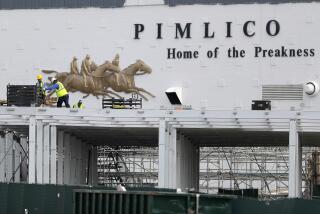HORSE RACING : Economic Conditions in Hungary Get Worse
- Share via
BUDAPEST, Hungary — Kincsem Park looks like a grand setting for thoroughbred racing. It is located in the midst of this beautiful city in a large tree-lined park, an extravagant piece of real estate that can accommodate a racetrack larger than any in the United States. A field of horses will emerge from the cover of foliage on the backstretch and then race down a stretch more than three-quarters of a mile long.
But the grandstand that overlooks this imposing course is dirty, deteriorating and -- on most days -- sparsely populated. A typical crowd of 2,500 spectators will bet less than $50,000 on a card of races for the lowest-grade thoroughbreds. Because the betting is so low, the track offers purse money that is pitiful by any nation’s standards: about $600 a race.
The economic condition of horse racing is so bad now that its survival is uncertain, both in Hungary and in other nations of the former Eastern Bloc. The sport is in even worse shape in Czechoslovakia. Racing is one of the many areas of life for which the introduction of democracy and the first steps toward a market economy have proved to be less than a blessing.
Racing was an important sport in Hungary in the last century; the mare Kincsem, who raced in the 1870s and won all 54 of her starts, was a national hero and remains one to this day. But two world wars virtually destroyed the nation’s breeding industry, and the sport was hardly compatible with the tenets of the communists who ruled for 40 years thereafter. Rough-and-tumble competition is part of racing’s ethic. “In the racing life, you cannot believe in the socialist way,” says Vince Szoke, manager of the country’s largest private racing stable.
Yet racing did survive under the old regime because the communists considered it part of the agriculture industry, supported horse breeding and tolerated the gambling that must accompany the game. Before he entered the private sector, Szoke managed a state-run farm with 110 thoroughbreds -- one of eight such operations in the country. There were about 20 trainers in Hungary, and they were for the state too. So the competition wasn’t great, the quality of the horses wasn’t great and the industry was being artificially propped up by the government. But at least it survived.
When communist rule ended, there was one hopeful sign for Kincsem Park: Australia’s off-track betting organization, the TAB, entered into a joint venture with the Hungarian racing industry to modernize its ancient parimutuel system. The machinery and television monitors at the track now are worthy of any top-class operation. But this joint venture has produced few positive results; business has dropped sharply at the track in the last few months.
At the start of the year, the Hungarian Parliament voted to raise the tax on wagering in a manner that would stun U.S. bettors, who feel crushed by a “take” of 20 percent or thereabouts. Under the old regime, the take had been 30 percent; a single act of the new parliament boosted the figure to 50 percent. Odds on any race are so unattractive that there frequently will be two horses in a race at less than even money; even a hard-core gambler would be discouraged from making a bet.
Other political and economic changes have hurt the sport too. Private ownership of racehorses is now permitted, and some small-scale owners now race a horse or two at Kincsem Park, but the abysmal purse money doesn’t give anybody a realistic chance to make a profit or a genuine incentive to get involved in the game seriously.
People involved in the racing industry hope that off-track betting, telephone betting and similar innovations can be introduced as a means to boost wagering and thus to increase purses. It was such expectations that prompted the Australians to get involved in Hungary at a time when the idea of joint ventures and burgeoning capitalism seemed full of magical promise. But it is going to take some real magic to revive horse racing in Eastern Europe.
More to Read
Go beyond the scoreboard
Get the latest on L.A.'s teams in the daily Sports Report newsletter.
You may occasionally receive promotional content from the Los Angeles Times.









